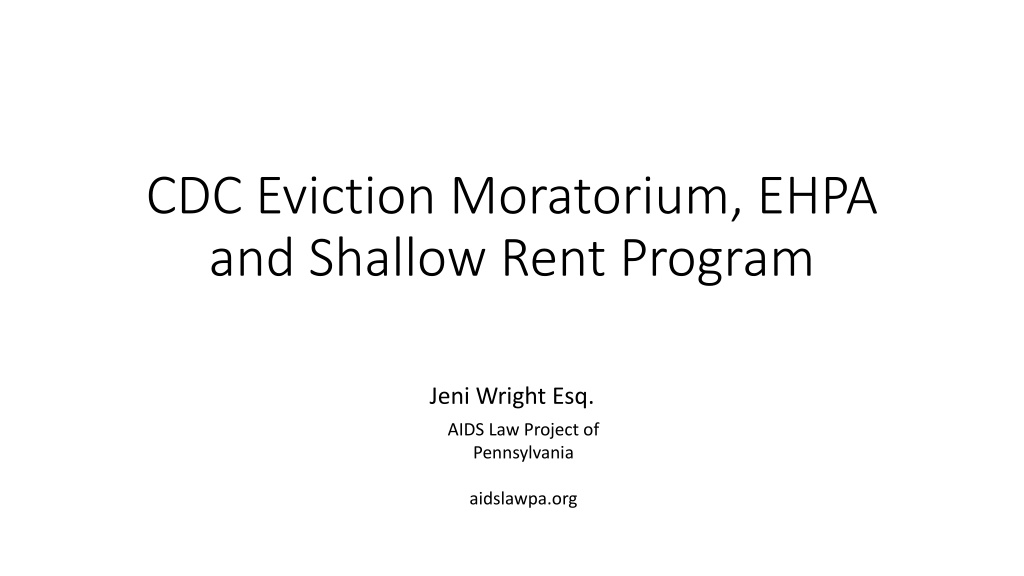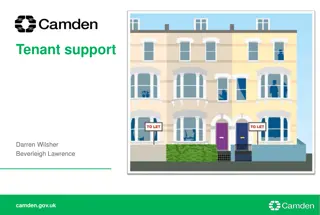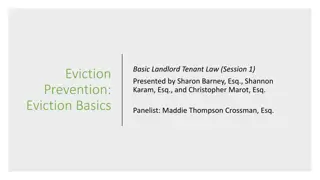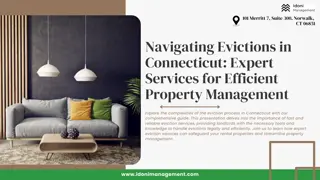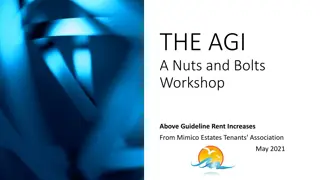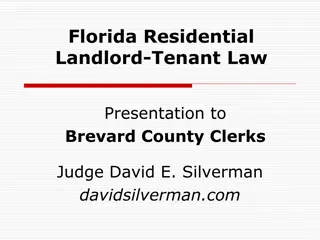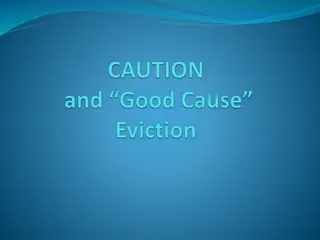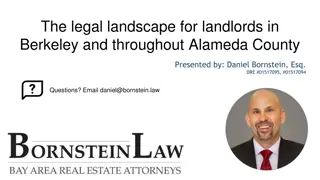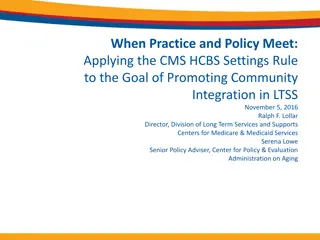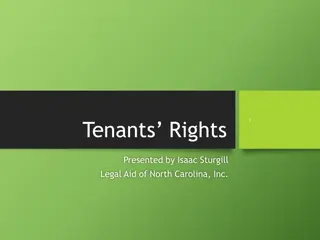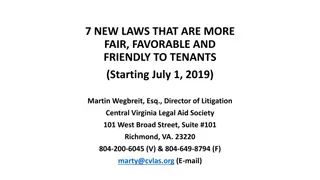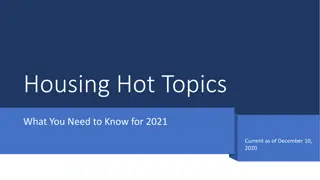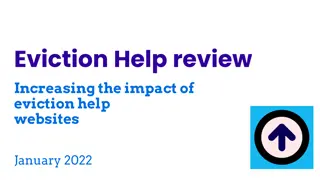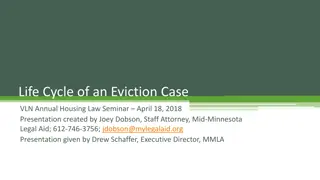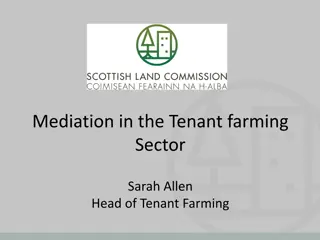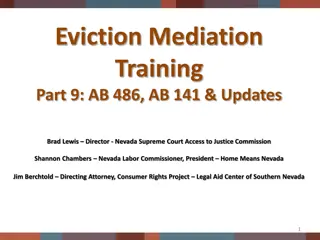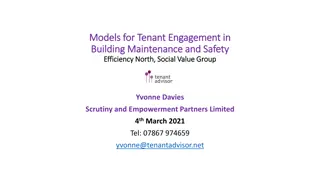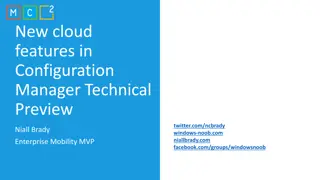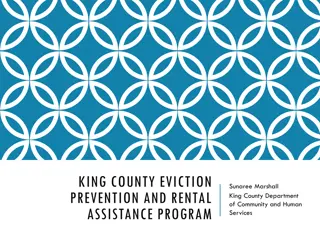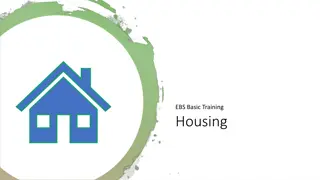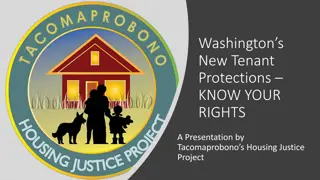Understanding CDC Eviction Moratorium and Tenant Protections
The CDC eviction moratorium, in effect from September 4, 2020, to December 31, 2020, temporarily prohibits landlords from evicting tenants for non-payment of rent if certain conditions are met. While rent is not cancelled, tenants can seek protection by submitting a declaration of income loss or significant medical expenses. However, eviction remains possible for reasons other than non-payment, such as criminal activity or threats to safety. Eligible tenants must meet specified criteria to qualify for these protections.
Download Presentation

Please find below an Image/Link to download the presentation.
The content on the website is provided AS IS for your information and personal use only. It may not be sold, licensed, or shared on other websites without obtaining consent from the author. Download presentation by click this link. If you encounter any issues during the download, it is possible that the publisher has removed the file from their server.
E N D
Presentation Transcript
CDC Eviction Moratorium, EHPA and Shallow Rent Program Jeni Wright Esq. AIDS Law Project of Pennsylvania aidslawpa.org
CDC EVICTION MORATORIUM On September 1, 2020 the Centers for Disease Control announced a national eviction moratorium that applies to many, but not all, tenants. The order will be in effect from September 4, 2020 through December 31, 2020. The order does not replace or override stronger state or local eviction protections in place
CDC Eviction Moratorium Order The order covers almost all rental properties, including single-family homes, mobile homes and apartments. The order bans landlords from evicting tenants for non-payment of rent through the end of 2020, IF the tenants have submitted a declaration of income loss or significant medical expense.
CDC Eviction Moratorium Order Once a tenant has sent the declaration to their landlord, no action can be taken to remove or cause the removal of that tenant for non-payment of rent before January 2021. Prohibited actions include serving an eviction notice, filing an eviction lawsuit, or harassing or intimidating a tenant to vacate. Tenants cannot be evicted for the non-timely payment of rent or similar housing-related payment (including non-payment or late payment of fees, penalties, or interest).
RENT IS NOT CANCELLED The CDC Moratorium does NOT cancel or stop the rent from being due when owed or from accruing.
TENANTS CAN STILL BE EVICTED FOR REASONS OTHER THAN NON-PAYMENT A tenant eligible for the moratorium s protections can still be evicted before January for engaging in criminal activity, while on the premises; threatening the health or safety of other residents; or violating any other contractual obligation, other than the timely payment of rent or similar housing-related payment (including non- payment or late payment of fees, penalties, or interest).
TENANTS ARE ELIGIBLE FOR PROTECTION IF Unable to pay the rent due to income loss or medical expenses Either expect to make less in 2020 than $99,000 individually or $198,000 as a family, or received a stimulus check or did not have to file a 2019 tax return Try, or have tried, to access any government rental assistance funds that may be available Agree to make partial rent payments based on what they can afford If evicted, would be homeless or would have to move into a crowded or substandard living situation
TENANTS MUST SUBMIT SIGNED DECLARATION TO GET PROTECTIONS To get these protections, the tenant and all adults living in the household must submit a signed declaration to their landlord stating they are eligible and telling the truth, under legal penalty. Tenants should keep a copy of the declaration and all correspondence with the landlord.
CDC DECLARATION I certify under penalty of perjury, pursuant to 28 U.S.C. 1746, that the foregoing are true and correct: I have used best efforts to obtain all available government assistance for rent or housing.(1) I either expect to earn no more than $99,000 in annual income for Calendar Year 2020 (or no more than $198,000 if filing a joint tax return), was not required to report any income in 2019 to the U.S. Internal Revenue Service, or received an Economic benefit Impact Payment (stimulus check) pursuant to Section 2201 of the CARES Act; I am unable to pay my full rent or make a full housing payment due to substantial loss of household income, loss of compensable hours of work or wages, lay-offs, or extraordinary out-of-pocket medical expenses(2); I am using best efforts to make timely partial payments that are as close to the full payment as the individual s circumstances may permit, taking into account other nondiscretionary expenses; If evicted I would likely become homeless, need to move into a homeless shelter, or need to move into a new residence shared by other people who live in close quarters because I have no other available housing options(3). I understand that I must still pay rent or make a housing payment, and comply with other obligations that I may have under my tenancy, lease agreement, or similar contract. I further understand that fees, penalties, or interest for not paying rent or making a housing payment on time as required by my tenancy, lease agreement, or similar contract may still be charged or collected. I further understand that at the end of this temporary halt on evictions on December 31, 2020, my housing provider may require payment in full for all payments not made prior to and during the temporary halt and failure to pay may make me subject to eviction pursuant to State and local laws. I understand that any false or misleading statements or omissions may result in criminal and civil actions for fines, penalties, damages, or imprisonment. _________________________________ Signature of Declarant 1 Available government assistance means any governmental rental or housing payment benefits available to the individual or any household member. 2 An extraordinary medical expense is any unreimbursed medical expense likely to exceed 7.5% of one s adjusted gross income for the year. 3 Available housing means any available, unoccupied residential property, or other space for occupancy in any seasonal or temporary housing, that would not violate Federal, State, or local occupancy standards and that would not result in an overall increase of housing cost to you. ________________ Date
Philadelphia Emergency Protection Housing Act (EHPA) Did you lose your job, lose hours at work, have to stay at home or couldn t find a job because of COVID-19? If yes, complete the EHPA COVID-19 Hardship Certification Form and send your landlord immediately.
http://www.phillytenant.org/wp-content/uploads/2020/09/EHPATenantFinancialCertification-791x1024.pnghttp://www.phillytenant.org/wp-content/uploads/2020/09/EHPATenantFinancialCertification-791x1024.png
EHPA PROTECTIONS By sending the COVID-19 Hardship Certification Form to your landlord, you have a right to: Go to mediation before your landlord files against you in court. Waive (cancel) recent late fees. Get on a repayment agreement for any rent owed.
COVID COVID- -19 Emergency Rental Assistance: 19 Emergency Rental Assistance: Apply for COVID-19 Emergency Rental Assistance: Phase 2 at phlrentassist.org/apply Pays up to $1500 per month in rent for up to 6 months. Only households that lost 30% or more of their income due to COVID-19 pandemic are eligible. Applications accepted on a first come, first served basis. If you applied for Phase 1 and received assistance, you may be eligible for Phase 2 but you must reapply. For eligibility information, visit phlrentassist.org/phase-2
SHALLOW RENT PROGRAM SHALLOW RENT PROGRAM Temporary COVID-19 rental assistance is available for people living with HIV in Philadelphia area. The Philadelphia Department of Public Health s AIDS Activities Coordinating Office (AACO) is funding the program with federal HIV funding Philadelphia Health Management Corporation (PHMC) administers the program
Shallow Rent Program Eligibility Requirements: - Living with HIV and have a current Ryan White certification card Experienced a loss of income related to COVID-19 Rent an apartment or house in Bucks, Chester, Delaware, Montgomery, or Philadelphia counties. Have a written lease signed by the property s landlord Gross household income no more than 500% of federal poverty level Not live in public housing or receive any other public rental assistance, like Section 8 or HOPWA You do NOT need to have contracted COVID-19 to obtain these benefits Preference will be given to applicants on the HOPWA waitlist administered by the Philadelphia Office of Homeless Services
Additional Requirements for Philadelphia Tenants Landlords must be current in City of Philadelphia taxes, have a rental license, and not have open, dangerous L&I violations. Landlords may be given a period of up to one week to obtain a rental license and/or become compliant with the Philadelphia Department of Revenue. PHMC will verify whether there is a rental license, whether the property is tax compliant, and whether the property has any open L&I violations.
Landlord requirements Landlords must ensure units are maintained up to local code Submit a signed Landlord Agreement and Acknowledgement Related to the COVID-19 Shallow Rent Emergency Program to the Medical Case Manager or Housing Counselor (HC) Abide by the stipulations delineated in the Landlord Agreement and Acknowledgement Related to the COVID-19 Shallow Rent Emergency Program If approved, a completed ACH form will be requested by PHMC so that payment can be made via direct deposit to the landlord.
Shallow Rent Program Benefits This grant provides temporary, one-time rent relief of at least $2500 or up to $5,000. Applicants are still eligible for DEFA assistance up to $2500 while participating in the shallow rent program. Eligible applicants will receive up to six months of rent paid directly to their landlord The first grant may cover up to three (3) months of forward rent, not to exceed $2,500 total for the three (3) month period. Please note that mortgage payments are NOT covered under this program. Approved applicants will be reassessed at the end of the initial 3 month assistance period and may be eligible for payments of up to $2,500 for an additional three (3) month periods, not to exceed to $5,000 in assistance over the course of a six month period, paid to the landlord of record.
Public Health Management Corporation (PHMC) Shallow Rent application process Applicants must submit: Completed application including the signed and dated Consent for Service form and Affidavit Copy of lease signed by landlord and tenant Proof of Ryan White certification Photo identification Income verification in the form of paystubs (or other documentation, if self employed) WHAT OTHER DOCUMENTATION Scanned documents are allowed if legible Applications must be submitted by the assigned medical case manager (MCM) or staff at an AACO-funded agency
Processing Shallow Rent Applications All applications are processed through PHMC. Information contained in this application is subject to the confidentiality provisions of PA Act 59. Applications must be faxed to 215-985-2099 to the attention of the DEFA Coordinator. Applications may not be submitted by regular mail, express mail or personal delivery. Original applications must be kept in applicant s file at the agency. Applications will be accepted until funds are exhausted
Processing Shallow Rent Payments PHMC will process payments to landlords The first payment will be paid within ten business days If necessary, PHMC will collect additional income verification information from MCM for approved applicants over the first 90 days after the first payment is processed.
Shallow Rent recertification and continued support The assigned MCM or agency staff will recertify approved applicants at least two weeks (and notify PHMC) before the end of the initial 3-month period to determine if they need continued assistance for an additional 3 months. The assigned MCM agency staff will recertify approved applicants every 90 days until they have received six months of rent support or $5,000 whichever occurs earlier. After the initial payment, PHMC may need to obtain additional documentation from the MCM for approved applicants to continue to receive assistance. While receiving rent assistance, approved applicants must report any changes in household size or income to their assigned case manager. Approved applicants should be evaluated by the assigned MCM or agency staff at the termination of the rental assistance to determine whether there is need for a referral to other programs or services.
